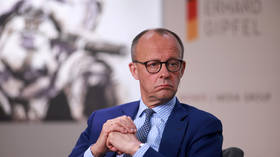Head of Germany’s CDU backtracks on cooperating with far right

Friedrich Merz, the leader of Germany’s Christian Democratic Union party (CDU), is attempting to save face after sparking a wave of backlash on Sunday by publicly rejecting calls for the far-right Alternative for Deutschland (AfD) to be banned and stating a willingness to cooperate with the controversial party at the municipal level.
In a statement to public broadcaster ZDF, Merz pointed out that “party bans have never led to solving a problem” and suggested that the CDU was open to cooperating with the AfD at the municipal level, noting that “local politics is different from state and federal politics.”
His comment came as the AfD has persistently been gaining in the polls and achieving triumphs in local elections in eastern Germany. Last month, the party secured for the first time a district council seat in Sonneberg in Thuringia and also won a mayoral election in the state of Saxony-Anhalt.
“Of course, that’s a democratic election. We have to accept that,” Merz said. “And of course we have to look for ways in the regional parliaments how we shape the city, the county, the regional district.”
Merz stressed, however, that he and his party nevertheless completely ruled out any cooperation with the AfD at the regional or federal level, or in the European Parliament.
“There will be no participation of the AfD in a government,” he insisted.
For the past decade, the CDU has repeatedly insisted on a “firewall” against any direct or indirect cooperation with the AfD, which it has accused of being beyond the pale for its nationalist, anti-migration, and climate-change denying policies.
Merz’s apparent shift in that policy resulted in a wave of backlash, including from his own fellow party members. The CDU’s Kai Wegner, the mayor of Berlin, proclaimed on Twitter that “the AfD knows only opposition and division” and questioned where there should be any cooperation with the party.
Green lawmaker Sara Nanni, meanwhile, called Merz the “wrecking ball of democracy” and called his proposal to cooperate with the AfD “dangerous.”
Following the backlash, Merz tried to walk back on his comments. In a tweet on Monday, the official stated that “CDU resolutions” still apply, stressing that “there will be no cooperation with the AfD, also at the municipal level.”
The official Twitter account for the CDU also wrote that there can be “no cooperation with the AfD, no matter what level,” and stated that what Merz was trying to say was that implementing this policy at the local level could be difficult.













